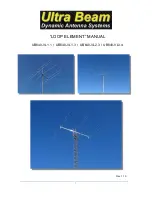
9711IMA-70
Site Survey
2-3
two accelerations – tangential and radial. These accelerations vary in a periodic function, out-of-phase from the
ship response to the wave motions.
Radial acceleration is the acceleration acting on the mass of the ADE pulling away from the center of the axis (roll
or pitch). In this sense, it would be a force trying to ‘pull’ the ADE away from the ship. We normally are not too
concerned with radial acceleration, since it must become far greater than gravity to have a detrimental effect on
the ADE.
Tangential acceleration is the acceleration acting on the mass of the ADE pulling across the center of the axis (roll
or pitch). This acceleration becomes a force trying to pull the ADE to the side. The tangential acceleration has an
effect on both the strength of the ADE pedestal and the tracking accuracy of the control algorithm.
The effect of tangential acceleration is felt by the structure of the ADE before it truly affects the tracking
accuracy. For instance, Sea Tel normally accepts that a tracking error of 0.1 degrees RMS at 0.5 G to be within
acceptable error margins. A 0.5 G tangential acceleration on the ADE means that ½ of the weight of the ADE is
acting sideways on the pedestal structure.
The higher up you mount the antenna above the pivot point of the ship the higher the tangential acceleration (g-
force) exerted on the antenna will be (see chart below). When the g-force exerted on the antenna is light, antenna
stabilization and overall performance will not be affected.
If the g-force exerted on the antenna is high enough (> 1 G), antenna stabilization and overall performance will be
affected.
If the g-force exerted on the antenna is excessive (1-2 Gs), the antenna will not maintain stabilization and may
even be physically damaged by the g-force.
2.5.
Mast Configurations
Sea Tel recommends the ADE be mounted on the ship in a location which has both a clear line-of-sight to the
target satellites in all potential azimuth/elevation ranges and sufficient support against vibration excitement. If
possible, mounting the ADE pedestal directly to ship deckhouse structures or other box stiffened structures is
preferred. However, in many cases, this imposes limits on the clear line-of-sight the antenna system has.
Often the solution for providing the full azimuth/elevation range the antenna needs is to mount the ADE on the
ship’s mast. Unfortunately, masts do not consider equipment masses in design and often have harmonic
frequencies of their own.
For these large systems, the mast for the ADE should be designed specifically for the ADE. Other equipment may
be mounted alongside, but the mast should be configured to accept the mass, loads and resonance of the ADE
primarily. The following sections describe various mast configurations and some considerations for mast design.
EAR Controlled - ECCN EAR99
Summary of Contents for SEA TEL 9711IMA-70
Page 6: ...9711IMA 70 vi This Page Intentionally Left Blank EAR Controlled ECCN EAR99...
Page 10: ...9711IMA 70 Table of Contents x This Page Intentionally Left Blank EAR Controlled ECCN EAR99...
Page 14: ...Introduction 9711IMA 70 1 4 This Page Intentionally Left Blank EAR Controlled ECCN EAR99...
Page 60: ...Setup Azimuth Trim 9711IMA 70 7 2 This Page Intentionally Left Blank EAR Controlled ECCN EAR99...
Page 74: ...Setup Targeting 9711IMA 70 10 4 This Page Intentionally Left Blank EAR Controlled ECCN EAR99...
Page 124: ...Drawings 9711IMA 70 18 2 This Page Intentionally Left Blank EAR Controlled ECCN EAR99...
Page 132: ...EAR Controlled ECCN EAR99...
Page 133: ...EAR Controlled ECCN EAR99...
Page 134: ...EAR Controlled ECCN EAR99...
Page 159: ...EAR Controlled ECCN EAR99...
Page 160: ...EAR Controlled ECCN EAR99...
Page 165: ...EAR Controlled ECCN EAR99...
Page 177: ...EAR Controlled ECCN EAR99...
Page 178: ...EAR Controlled ECCN EAR99...
















































